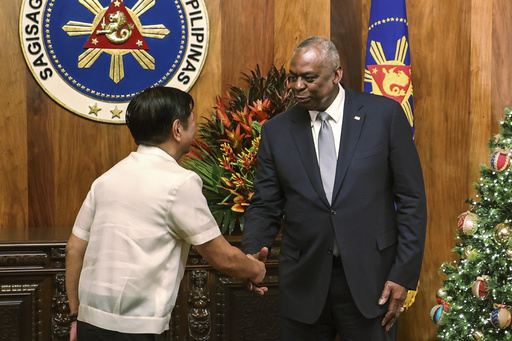
U.S. Defense Secretary Lloyd Austin publicly denounced the reckless actions of China against the Philippines and reiterated that the United States is ready to defend its treaty ally if Filipino forces face an armed assault in the increasingly tense waters of the South China Sea. During his visit to Palawan, a Philippine province adjacent to this contested area, Austin was questioned about whether military support from the U.S. would remain steadfast under the incoming administration of President Donald Trump, particularly concerning a new $500 million military funding package for the Philippines.
Austin conveyed optimism that the enduring alliance would continue regardless of changes in leadership, stating, “We stand with the Philippines and we condemn dangerous actions by the PRC against lawful Philippine operations in the South China Sea.” He expressed deep concern regarding the conduct of the People’s Republic of China (PRC), highlighting the use of risky and aggressive tactics to assert their extensive maritime claims in the region.
China is not only involved in territorial disputes with the Philippines but has also clashed with smaller nations like Vietnam, Malaysia, and Indonesia, posing significant risks in a crucial global trade and security passage. Long-standing disputes also involve countries like Brunei and Taiwan, intensifying the complexity of the situation.
The Biden administration made strides in fortifying military alliances across the Indo-Pacific to effectively challenge China’s influence, especially regarding future tensions related to Taiwan or the South China Sea, which China claims almost entirely. This move aligns with the strategic efforts of Philippine President Ferdinand Marcos Jr. to enhance his nation’s defense capabilities in response to escalating territorial clashes between Chinese and Filipino forces.
Amidst discussions about Trump’s potential approach towards U.S. military involvement in Asia, Marcos conveyed his congratulations to Trump on his electoral triumph through a phone call and expressed a commitment to fortifying the alliance with the United States. He stated, “I expressed to him our continuing desire to strengthen that relationship between our two countries, which is as deep as can possibly be because it has been for a very long time.”
Austin made these remarks during a joint news briefing with Philippine Defense Secretary Gilberto Teodoro at a military base in Palawan. During this event, they were shown an unmanned vessel funded by the U.S. for the Philippine Navy, aimed at aiding intelligence collection and defense surveillance.
Reaffirming the unwavering U.S. commitment to the Philippines, Austin highlighted that the Mutual Defense Treaty encompasses the armed forces of both nations, covering public vessels and aircraft “anywhere in the South China Sea.” He also reiterated the U.S. dedication to enhancing the Philippines’ defense capabilities to counter coercion effectively.
On a previous day, Austin and Teodoro formalized an agreement designed to protect sensitive military intelligence and technology exchanges that the U.S. intends to provide to the Philippines. The Department of National Defense in Manila indicated that the agreement seeks to maintain the confidentiality of classified military information and would enable the Philippines to gain access to more advanced capabilities and high-value equipment from the U.S.
Although no specific details were shared, two Philippine security officials indicated that this agreement, akin to those established with other allied nations, would permit the U.S. to supply the Philippines with enhanced intelligence and advanced weaponry, including missile systems. Furthermore, it will allow the Philippine military to utilize U.S. satellite and drone surveillance systems with assurances that sensitive information regarding advanced weaponry will be safeguarded against leaks.
A spokesperson for China’s Foreign Ministry, Lin Jian, stated on Monday that no military agreements should be aimed against any third party and should not disrupt regional stability or escalate tensions.
